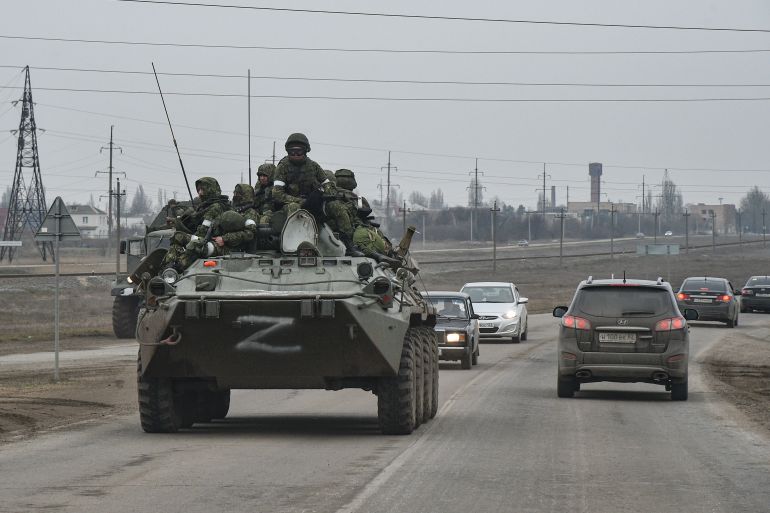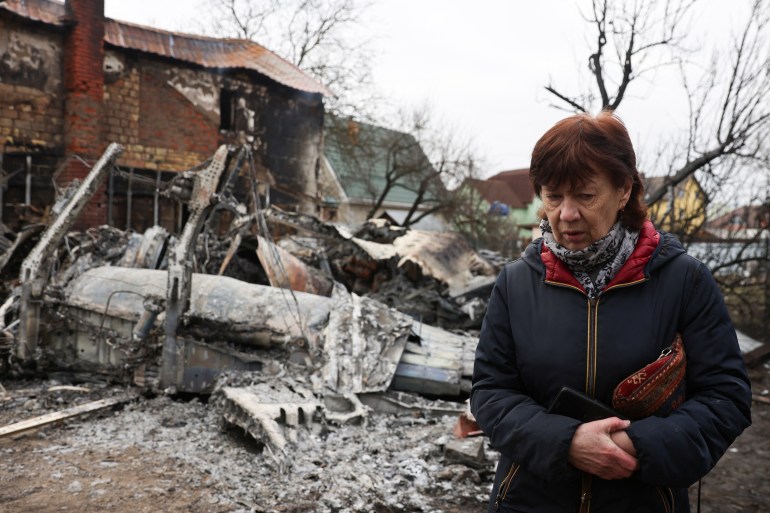Gunfire and explosions heard as Kyiv braces for Russian assault
Russian forces bombed Kyiv while European Union leaders announced sanctions against President Putin and his foreign minister.

Russian troops bore down on Kyiv and explosions and gunfire sounded around the city on the second day of Russia’s attack on Ukraine, as President Vladimir Putin demanded Ukrainian troops lay down their arms.
The invasion focused on the Ukrainian capital on Friday and residents heard explosions starting before dawn and gunfire was reported in several areas.
Keep reading
list of 4 itemsRussians are Putin’s victims too
List of sanctions against Russia after it invaded Ukraine
Turkey says cannot stop Russian warships accessing Black Sea
Five explosions struck near a major power plant on Kyiv’s eastern outskirts, said Mayor Vitali Klitschko. There was no information on what caused them and no electrical outages were immediately reported.
“Shots and explosions are ringing out in some neighbourhoods. Saboteurs have already entered Kyiv,” said the mayor of the city of three million. “The enemy wants to put the capital on its knees and destroy us.”

Moscow said it had captured the Hostomel airfield northwest of the capital – a potential staging post for an assault on Kyiv that has been fought over since Russian paratroopers landed there in the first hours of the war. This could not be confirmed and the Ukrainian authorities reported heavy fighting there.
Intense gunfire broke out on a bridge across the Dnieper river dividing eastern and western Kyiv, while another key bridge to the capital was blown away. Some residents sheltered in underground metro stations.
Windows were blasted out of a 10-storey apartment block near the main airport. A two-metre crater showed where a shell had struck before dawn.
“How can we be living through this in our time? Putin should burn in hell along with his whole family,” said Oxana Gulenko, sweeping broken glass from her room.
Владимир Зеленский опубликовал видео из Киева.
«Мы тут. Мы в Киеве. Мы защищаем Украину», – подписал он эти кадры. pic.twitter.com/r72ezM5DAI
— РБК (@ru_rbc) February 25, 2022
Ukrainian President Volodymyr Zelenskyy tweeted that there had been heavy fighting with people killed at the entrance to the eastern cities of Chernihiv and Melitopol, as well as at Hostomel.
Witnesses said loud explosions and gunfire could also be heard near the airport in Kharkiv, Ukraine’s second city, close to Russia’s border, and air raid sirens sounded over Lviv in the west. Authorities reported heavy fighting in the eastern city of Sumy.
Putin has said he does not plan a military occupation. The Russian leader claims he wants to dimilitarise Ukraine and urged Ukrainian soldiers to mutiny in order to prevent wider bloodshed.
“Take power into your own hands, it will be easier for us to reach agreement,” Putin said at a televised meeting with Russia’s Security Council on Friday.
United States officials believe Russia’s initial aim is to “decapitate” Zelenskyy’s government. Zelenskyy said he knew he was “the number one target” but would stay in Kyiv.
Casualties
Ukrainian officials reported at least 137 deaths on their side and claimed hundreds on the Russian one. Russian authorities released no casualty figures, and it was not possible to verify the tolls.
The United Nations said at least 25 civilians had been killed and 102 wounded, figures that were likely to be a “significant under-estimate”.
UN agencies said as many as five million people could try to flee abroad and that more than 50,000 refugees had already crossed into neighbouring countries. Ukraine has banned men of fighting age from leaving, and at borders with Poland, Romania, Hungary and Slovakia, those crossing were mostly women and children.
NATO chief Jens Stoltenberg said the US-led military alliance was bolstering its defences with troops and air power on its eastern flank in response to Russia’s actions.
He said allies had activated defence plans and “as a result … are deploying elements of the NATO Response Force on land, at sea and in the air”. This included thousands more troops and over 100 fighter jets being put on high alert in 30 locations, Stoltenberg added.

Sanctions announced
Envoys of the EU’s 27 member states agreed to freeze any assets in the EU belonging to Putin and his foreign minister Sergey Lavrov, adding to a slew of sanctions backed by the leaders at an emergency summit on Thursday night.
Numerous Western countries have announced new sanctions on Russia, including blacklisting its banks and banning technology imports.
But they have so far stopped short of forcing it out of the Society for Worldwide Interbank Financial Telecommunication (SWIFT) system for international bank payments, drawing criticism from Kyiv which says there is no reason to hold back.
Al Jazeera’s Dominic Kane speaking from Berlin, Germany said there was “some unease” in several European countries about banning Moscow from SWIFT.
“In cutting off Russian access to SWIFT, it might cause such a negative effect on the economies in Germany, Italy and elsewhere in Europe that it’s a step they aren’t really prepared right now to consider,” Kane added.
Russia is one of the world’s biggest energy producers and Europe’s biggest gas supplier, and both it and Ukraine are among the top exporters of grain. War and sanctions will disrupt economies around the world.
Oil and grain prices have soared. Share markets around the world, many of which plunged on Thursday at news of the outbreak of war, were mainly rebounding on Friday.
An adviser to Zelenskyy said Ukraine was prepared for talks with Russia, including on staying neutral, one of Moscow’s pre-war demands, but the prospects for dialogue appeared dim. The Kremlin said it had offered talks in the Belarusian capital Minsk, but that Ukraine had proposed Warsaw instead and there was now a “pause” in contacts.